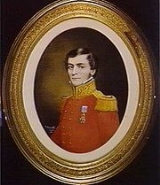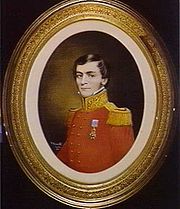
Andrew Clarke
Encyclopedia

Royal Guelphic Order
The Royal Guelphic Order, sometimes also referred to as the Hanoverian Guelphic Order, is a Hanoverian order of chivalry instituted on 28 April 1815 by the Prince Regent . It has not been conferred by the British Crown since the death of King William IV in 1837, when the personal union of the...
(1793 – 11 February 1847) was Governor
Governor of Western Australia
The Governor of Western Australia is the representative in Western Australia of Australia's Monarch, Queen Elizabeth II. The Governor performs important constitutional, ceremonial and community functions, including:* presiding over the Executive Council;...
of Western Australia
Western Australia
Western Australia is a state of Australia, occupying the entire western third of the Australian continent. It is bounded by the Indian Ocean to the north and west, the Great Australian Bight and Indian Ocean to the south, the Northern Territory to the north-east and South Australia to the south-east...
from 1846 until his death in 1847.
Andrew Clarke was born in Donegal
Donegal
Donegal or Donegal Town is a town in County Donegal, Ireland. Its name, which was historically written in English as Dunnagall or Dunagall, translates from Irish as "stronghold of the foreigners" ....
, Ireland
Ireland
Ireland is an island to the northwest of continental Europe. It is the third-largest island in Europe and the twentieth-largest island on Earth...
in 1793. He entered the British Army
British Army
The British Army is the land warfare branch of Her Majesty's Armed Forces in the United Kingdom. It came into being with the unification of the Kingdom of England and Scotland into the Kingdom of Great Britain in 1707. The new British Army incorporated Regiments that had already existed in England...
as an Ensign
Ensign (rank)
Ensign is a junior rank of a commissioned officer in the armed forces of some countries, normally in the infantry or navy. As the junior officer in an infantry regiment was traditionally the carrier of the ensign flag, the rank itself acquired the name....
in the 8th West India Regiment
West India Regiment
The West India Regiment was an infantry unit of the British Army recruited from and normally stationed in the British colonies of the Caribbean between 1795 and 1927. The regiment differed from similar forces raised in other parts of the British Empire in that it formed an integral part of the...
(without purchase) at the age of 13 in 1806, and rose rapidly through the ranks. In 1808 he transferred to the 46th Foot as Lieutenant
Lieutenant
A lieutenant is a junior commissioned officer in many nations' armed forces. Typically, the rank of lieutenant in naval usage, while still a junior officer rank, is senior to the army rank...
, again without purchase. At the age of 18, he was given temporary command of the troops in Van Diemen's Land
Van Diemen's Land
Van Diemen's Land was the original name used by most Europeans for the island of Tasmania, now part of Australia. The Dutch explorer Abel Tasman was the first European to land on the shores of Tasmania...
. In 1813 he became a Captain and went to New South Wales
New South Wales
New South Wales is a state of :Australia, located in the east of the country. It is bordered by Queensland, Victoria and South Australia to the north, south and west respectively. To the east, the state is bordered by the Tasman Sea, which forms part of the Pacific Ocean. New South Wales...
with his regiment. In 1818 he was in India
India
India , officially the Republic of India , is a country in South Asia. It is the seventh-largest country by geographical area, the second-most populous country with over 1.2 billion people, and the most populous democracy in the world...
, and in 1823 he married a widow named Frances Lardner, while on leave in England. A son was born on July 1824. In 1825 he purchased a Major
Major
Major is a rank of commissioned officer, with corresponding ranks existing in almost every military in the world.When used unhyphenated, in conjunction with no other indicator of rank, the term refers to the rank just senior to that of an Army captain and just below the rank of lieutenant colonel. ...
ity. He returned to Europe in 1833, was created a knight of the Royal Hanoverian Guelphic Order
Royal Guelphic Order
The Royal Guelphic Order, sometimes also referred to as the Hanoverian Guelphic Order, is a Hanoverian order of chivalry instituted on 28 April 1815 by the Prince Regent . It has not been conferred by the British Crown since the death of King William IV in 1837, when the personal union of the...
in 1837, was promoted to Lieutenant-Colonel in the Army in 1838, and purchased the Lieutenant-Colonelcy of his regiment in 1839. In 1842 Colonel Clarke took his regiment to the West Indies and was appointed Lieutenant-Governor of St. Lucia, which he left in 1844. In the following year he exchanged into the 41st Foot and was appointed Governor of Western Australia, where he arrived on 26 January 1846. He became ill not long afterwards and died on 11 February 1847.
Andrew's Clarke's son, also named Andrew Clarke
Andrew Clarke (administrator)
Lieutenant-General Sir Andrew Clarke, GCMG, CB, CIE was a British soldier and governor as well as a politician in Australia.-Background and education:...
, held a number of important public positions for the colony of Victoria
Victoria (Australia)
Victoria is the second most populous state in Australia. Geographically the smallest mainland state, Victoria is bordered by New South Wales, South Australia, and Tasmania on Boundary Islet to the north, west and south respectively....
, and was a for a time a Member of its Legislative Assembly
Victorian Legislative Assembly
The Victorian Legislative Assembly is the lower house of the Parliament of Victoria in Australia. Together with the Victorian Legislative Council, the upper house, it sits in Parliament House in the state capital, Melbourne.-History:...
. For six years, he was the governor of the Straits Settlements
Straits Settlements
The Straits Settlements were a group of British territories located in Southeast Asia.Originally established in 1826 as part of the territories controlled by the British East India Company, the Straits Settlements came under direct British control as a crown colony on 1 April 1867...
in Malaya
British Malaya
British Malaya loosely described a set of states on the Malay Peninsula and the Island of Singapore that were brought under British control between the 18th and the 20th centuries...
. His stepdaughter, Fanny Jackson, married George Fletcher Moore
George Fletcher Moore
George Fletcher Moore was a prominent early settler in colonial Western Australia, and "one [of] the key figures in early Western Australia's ruling elite"...
. Amongst his nephews was the Australia
Australia
Australia , officially the Commonwealth of Australia, is a country in the Southern Hemisphere comprising the mainland of the Australian continent, the island of Tasmania, and numerous smaller islands in the Indian and Pacific Oceans. It is the world's sixth-largest country by total area...
n novelist and poet
Poet
A poet is a person who writes poetry. A poet's work can be literal, meaning that his work is derived from a specific event, or metaphorical, meaning that his work can take on many meanings and forms. Poets have existed since antiquity, in nearly all languages, and have produced works that vary...
Marcus Clarke
Marcus Clarke
Marcus Andrew Hislop Clarke was an Australian novelist and poet, best known for his novel For the Term of his Natural Life.- Biography :...
.

